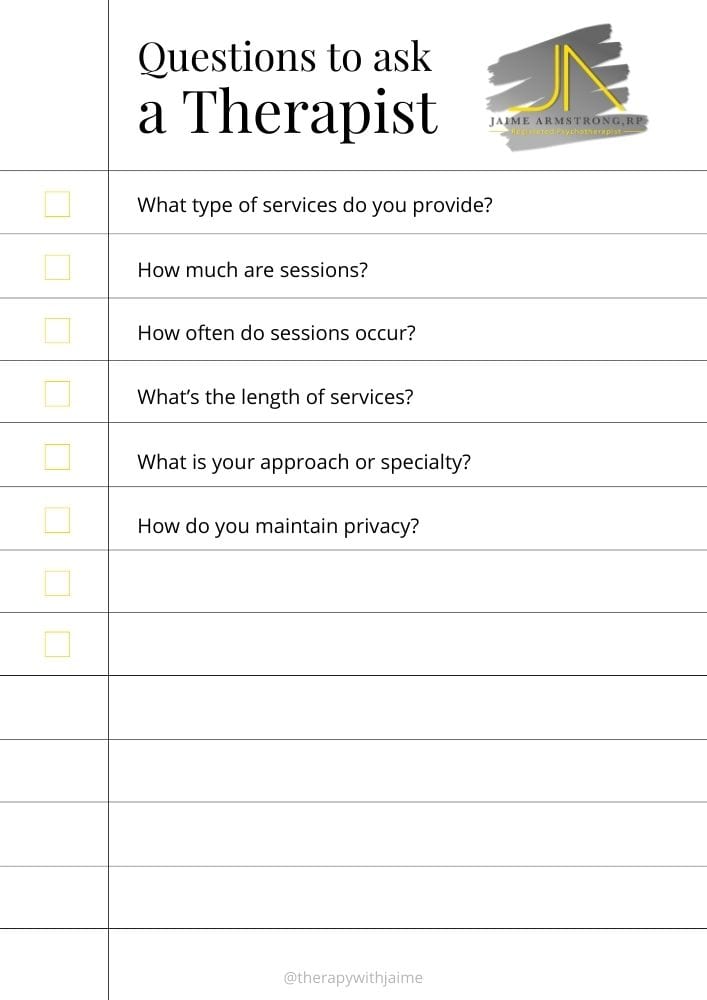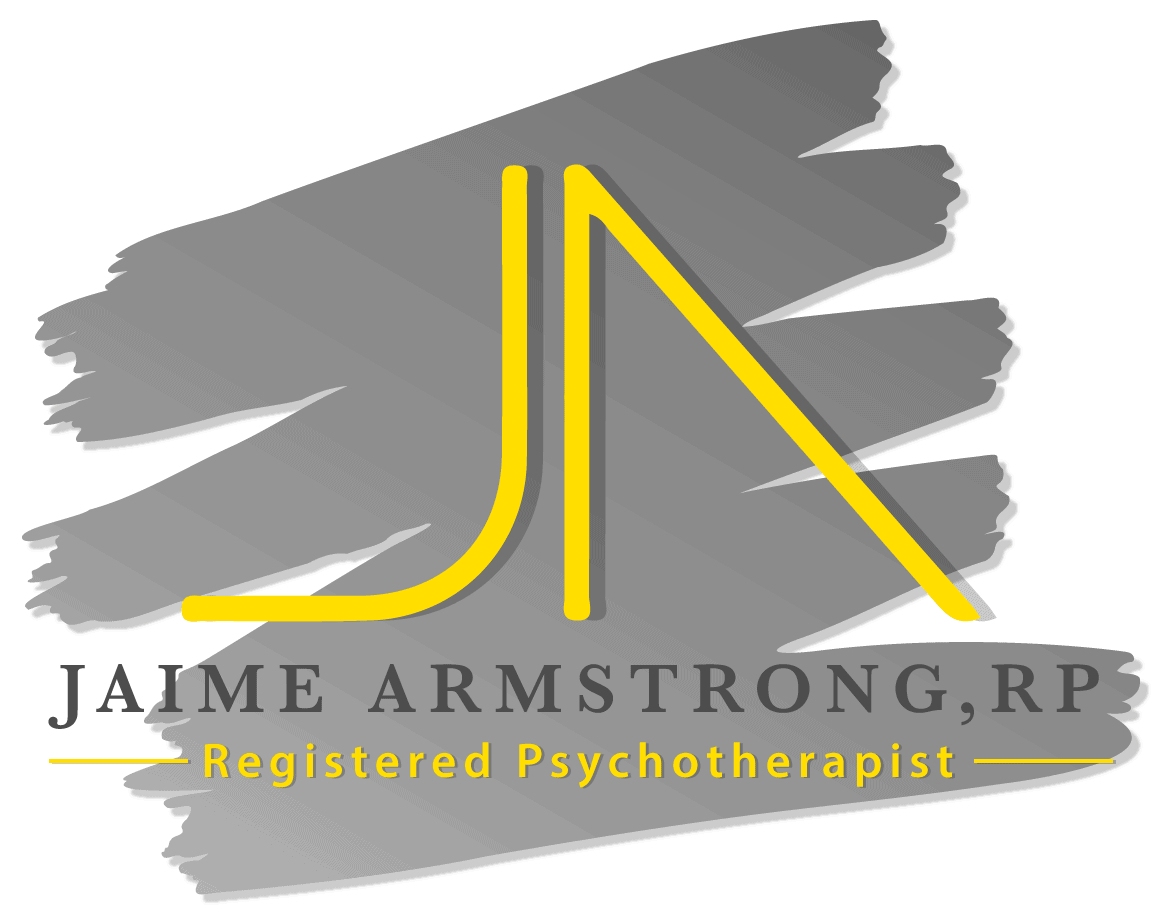Making the decision to begin therapy can be both a nervous and exciting experience. Congratulations! The hardest part is over! You made the decision to consider it and now it’s time to get started. I’ve created a list of what to know before you go to make this process one that is informed, comfortable, and easy to navigate. There are therapists everywhere and with the options of online counselling it may seem overwhelming to begin! So let’s make this easier with some tips and thoughts to narrow and focus your search and get you started with therapy!

So first up, how do I find a therapist?
My go to answer for this is always to ASK! Ask your friends, ask your family, ask your colleagues. Listen, the days of keeping therapy a secret are OVER! Statistically we know that 1 in 5 people will experience struggles with mental health in Canada.y the age of 40, 50% of the population have either previously or currently experienced mental health concerns. And with COVID I’m going to guess new data will show an increase in this. Your friends, family, coworkers, neighbours, etc. have either gone to or currently attend therapy. So let’s get talking about it! My favourite thing about working with teenagers is that they tell me how they talk about therapy with their friends. They share and recommend therapists the same as they share where they shop or get their hair done or who they follow on social media. I’m excited for the younger generations because they get it. So let’s help you get it too!
When thinking about therapy, start with asking people you know if they go, who they see, and what recommendations they have. And if you aren’t ready to ask your friends and family, then ask your doctors and medical professionals. Ask your massage therapist, your chiropractor, your naturopath, and your dietician. Ask your family doctor. Ask your dentist. Do you see where I’m going with this here? Ask anyone! Specifically though, your medical professionals would have information for you on where to best direct you for what and who is available in your area. In my practice I regularly check in with the chiros and naturopaths in the area so they know my availability and services and can share about it as concerns come up from their patients and clients.
And I get it, you might not feel ready to ask (even though I think you’ll find when you do ask you’ll get even more support because you’ll know you aren’t alone!) so another place I’d suggest to ask is….(drum roll please)….Google! Yup, just Google it. The power of the Internet will bring you an endless amount of information about therapists in your area and beyond!
So, when you Google therapists, here’s a couple of things to look for:
1. Reviews
Now therapists cannot ask for reviews (at least in Ontario their regulations state they cannot ask for this) however consumers love leaving reviews so you may find therapists in your area with Google reviews. Read them! If you aren’t ready to ask your friends and family then at least hear what others who have been to those therapists have to say.
Now reviews work for those therapists who are online with their own website and are found on Google. Some therapists aren’t on easily found on the internet.That doesn’t mean anything other than technology might not be their thing. So another place to consider online when Googling

2. Psychology Today
Psychology Today is a website I recommend that works all over for finding a therapist. Most therapists, including myself, pay for a directory listing on this site, so they can be easily found and searched for. Again, not all therapists are on here, but it’s a great start to search specifically for your needs and get a lot of info on a lot of therapists all at once.
If you want a real deep dive of the Internet to find a therapist, then check out their social media, if they have it! Because again, not all therapists do, and it doesn’t mean anything other than they don’t use it.
When you think of something and stuff shows up.
3. Social Media
Social media is a useful resource because you can search for therapists and get a sense of their style, what they share, what kinds of therapy they offer – all sorts of information to help you decide if you want to reach out to them. You’re searching for someone you connect with and social media gives you that immediate glimpse into who they are and their practice. What I also like about this tool to find therapists is that you can follow them for a bit before making your decision on reaching out to them! It’s a win-win! You learn more and if you don’t like them you unfollow, and they’ll never know. But if you do like what you see then you reach out and are connected between your sessions!
But searching for a therapist can be a rabbit hole
that goes on and on and on because there are so many to choose from! So let’s narrow things down even more!

When it comes to providing counselling and therapy services, there are different types of service providers. Generally, in the field of mental health there are four types of providers; Psychiatrist, Psychologist, Social Worker, and Psychotherapist. In the US and other areas there are other names for these providers but most often it’s the same in terms of education. So here’s a breakdown of each of these providers within Canada and the specifics on what to know about the differences of each.
Psychiatrists have medical degrees and are doctors who specialize in mental health. They are able to assess and provide mental health diagnoses, prescribe and monitor medications for mental health, and provide psychotherapy services. Services with a psychiatrist are covered under OHIP.
Psychologists have masters and doctoral degrees in psychology and provide specialized testing and assessments to diagnose and treat mental health. They are unable to prescribe medications and some, not all, of their services are covered under OHIP.
Registered Social Workers (credentials are RSW) and Registered Psychotherapists (credentials are RP) are similar and are both able to provide counselling and therapy services. The difference between the two is related to education and training. Social Workers are well versed in understanding systems and community factors within society and the impact this may have on an individual and their functioning, while Psychotherapists are well versed in understanding human development and applying counselling theories to address change. In Canada, neither Social Workers nor Psychotherapists can diagnose mental health concerns and are not covered under OHIP.
Each profession is regulated under a governing body and must be registered and within good standing to use their professional title. Some Psychologists and Psychotherapists may be working towards their full titles, so you may see providers listed as Associate or Qualifying, which means they are in the process of meeting requirements to be fully licensed and registered. Regardless of which provider you choose, please ensure they are a licensed/registered provider. Being licensed and registered is meant to regulate the professional and protect you as a client, so you can also check out the websites of the governing body of the provider to ensure they are legit and in good standing with their colleges.
So now you know where to find therapists who provide counselling services and also who they are, so let’s talk about how to access them. In Canada the four ways to access counselling services are through Community programs, Employee and Family Assistance Plans, Extended Health Benefits, and Private. Each one is significantly different and varies in how it impacts your therapist search.
Here’s a breakdown of each:
Community counselling services are Ministry funded programs provided within the community, through an agency, and are free with both short and long term services. Anyone can access these services however each program and service has different requirements, such as age, type of service, etc. Attending a walk-in session or being referred by your doctor gets you started here. Because these programs are free the waitlists for them can range from 3 to 18 months.
Employee & Family Assistance Plan (EFAP or EAP) services are short termed therapy sessions funded by your employer. This is different from your Extended Health Benefits below. EFAP are free to you and an additional benefit some employers may offer. They contract with a global company that contracts with therapists to provide employees with short-term therapy sessions. Although your employer covers it, the sessions are private and confidential to you. You don’t even have to let your employer know if you use them. You can access these services yourself by calling the phone number for the contracted company. They then send the referral to Counsellors who are contracted with them. Most of the time this is a random pairing based on needs and experience however there are programs where if you know a therapist works with them, you can request them by name. Besides this being free to you, another benefit is that you get an immediate response and appointment for services. Each EFAP program is different and varies in terms of how many sessions are available to you and your family. It may also be available to you regardless if you are full, part, or casual time status at work.
Extended Health Benefits are different from EFAP because this is an overall benefit plan provided by your employer, which covers lots of different health benefits. Specifically for counselling, this benefit is one where you may have a maximum amount to use within a year’s time and is then renewed each year. Under this benefit you would pay for the service directly and then be reimbursed by the insurance provider upon submitting the receipt for your session. While the provider may specify which type of therapist you see (Psychologist, Social Worker, or Psychotherapist), you get to choose who within those credentials you meet with.
Private services refer to when none of the above benefits apply and you seek services with whomever you want and pay directly out of pocket. Regardless of whom you see, always keep the receipts for these sessions and one’s in which you pay and are not reimbursed (extended health benefits) because counselling services are eligible to be claimed under the Medical Expense Tax Credit on your taxes. Make sure to connect with your Accountant about this.
While the above services cover the four most general ways to access counselling, there are other specific government funded programs within Ontario and Canada that provide therapy at no cost to those who qualify. There are lots, but here’s a few to consider:
The Non-Insured Health Benefit (NIHB) provides counselling services to those recognized as Inuit or registered First Nations.
Those that have been victims of violent crimes and unable to afford services, may be able to access funding for services through the Ministry of the Attorney General’s Victims Quick Response Program (VQRP).
Services are also available to children, youth, and their families, who have been impacted by Internet exploitation through the ICE (Internet Child Exploitation) Counselling Program.
And for any Canadian military veterans, therapy services may be provided through Veteran’s Affairs Canada.
All of these programs have qualifications to receive services and contract with providers who are approved to provide the services at no cost to you. Similar to EFAP, if you know of a therapist who works with these programs you can call and request them specifically.
As you can see you have LOTS of options of how and where to find a therapist. There is no order of steps to follow for this process. You can start by asking around for recommendations. Or you can start with finding out what benefits or services are available to you. You can even start with deciding what type of provider you want to see. Wherever you start it begins narrowing down the search. There’s value in ensuring there’s a fit with a therapist before starting therapy because having that therapeutic alliance creates the best opportunity for change.
So let’s maximize this alliance and opportunity for change! You can do this by asking potential therapists if they provide FREE consultations to get to know them and ask your questions to make an informed decision on who you see. Use this time to connect and learn more if they are a fit for you. Depending on where you live and what resources are available to you, finding someone with similar lived experiences may be limited. Use the consultation to interview a therapist to learn how they are inclusive or how they are a fit for you in terms of experience, approach, and/or logistics.
Specifically here is a list of questions to ask to get started:
What type of services do you provide?
-Therapy can be provided in individual, group, family, or couples formats. They can also be provided in person, online, or over the phone. If you know specifically what type of therapy you want then that helps to match with therapists who provide that.
How much are sessions?
-Definitely find this out! Therapy is a commitment of time and money and each therapist charges differently. Some charge by hour, some by session, some have different rates for the type of session (individual versus family). Some have fees for report writing, phone calls, and cancellations. Some may also offer sliding scale fees, which means you pay what’s affordable to you. It’s okay to ask for this!
How often do sessions occur? What’s the length of services?
-As I said, therapy is a commitment of time and money. Get a sense of how long you can expect to receive services for and how often you meet. Some people schedule weekly or biweekly sessions. While no therapist can give an exact amount prior to knowing or meeting with you, they can provide an estimate or average length of time they meet with people.
What is your approach or specialty?
-Therapists are trained in different counselling theories and approaches. This may also influence what their specialty is. While therapists can spit out many names of theories they use or are trained in that may not mean much to you. What you really want to know when asking this question is, do they know their stuff and are they effective! Are they trained in trauma? Do they specialize in it? Anyone can provide couples counselling, but you want to see someone who is trained in couples counselling theories specifically. Do they work with children, teens, or adults? With these questions you are finding out what the expertise of the therapist is and how do they communicate that to you so you understand it too!
How do you maintain privacy?
-While most therapists are providing sessions online due to COVID currently, this privacy question is super valuable in finding the right fit for you! When meeting in person make sure to ask if your sessions are private. While the session itself is private sometimes therapists schedule clients back to back, so you may run into people in the waiting room. Find out how the therapist schedules appointments and if there’s separate entry and exits if you want total confidentiality. For online sessions, find out what platforms they use and how they secure records. Your services are private, and you want to make sure you understand the limits of that and the steps the therapist takes to ensure confidentiality.
Download this checklist to get started on your search:

So, ask away, see how they respond, and see how you feel when speaking with them. If it’s a fit you’ll feel heard, understood, listened to, connected with, and most importantly uplifted and excited to book a session with them. Anything else I’d say keep looking or ask if they have any suggestions for others you could speak with.
Ultimately, no matter what, the therapist you see is your choice! Even if the service is provided through an agency, EFAP, or a place where the person is assigned to you. You can ask for someone different or request someone who matches your interests or wants. You have a say in who you connect with and have the right to be specific in your needs and fit. Remember, you made the decision to seek counselling. That was the hard part, and now it’s done! Way to go! You’re already on the way to making a shift happen. Finding someone to be part of that with you will be much easier now with all you’ve learned about how to find a therapist.


